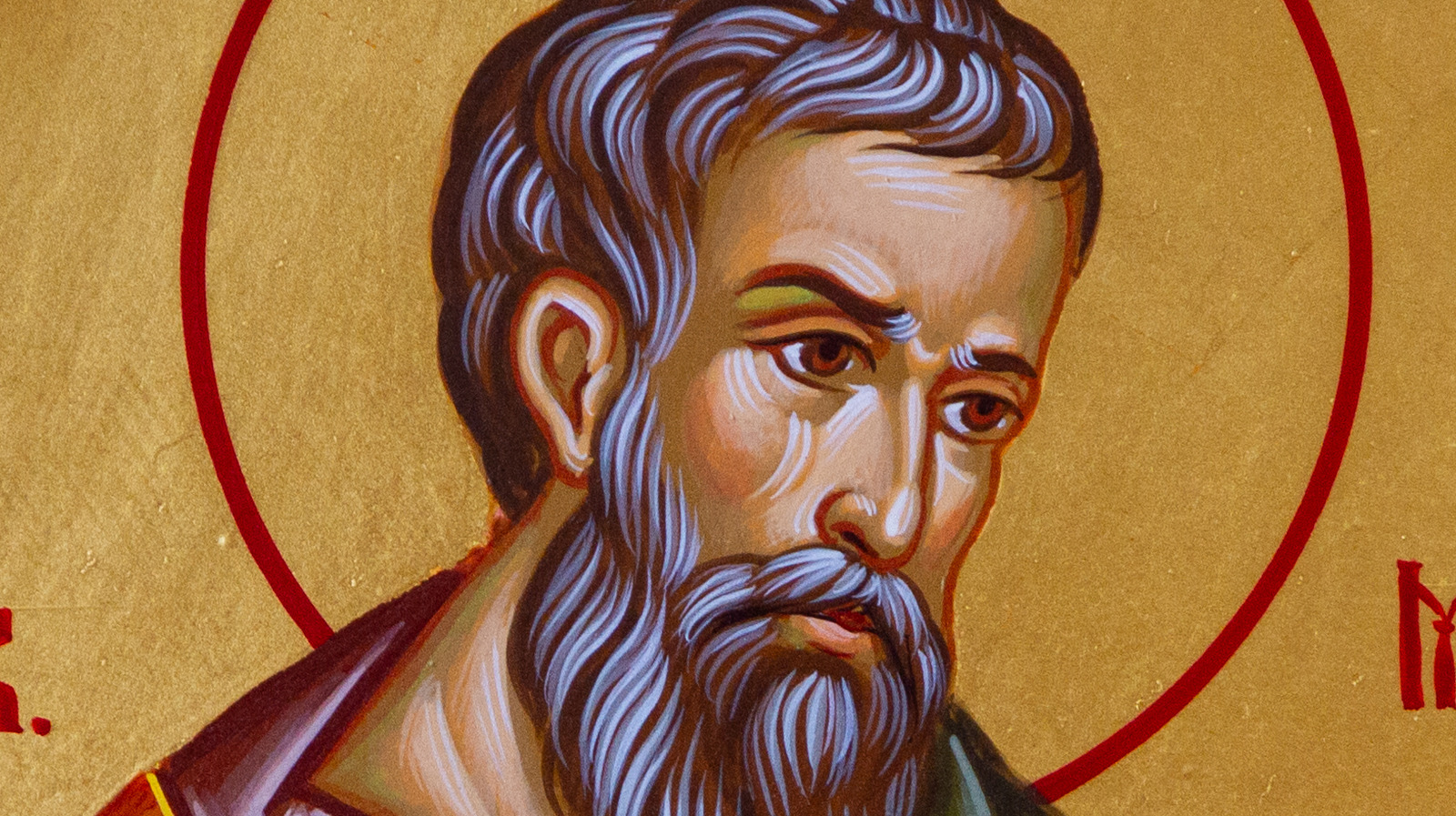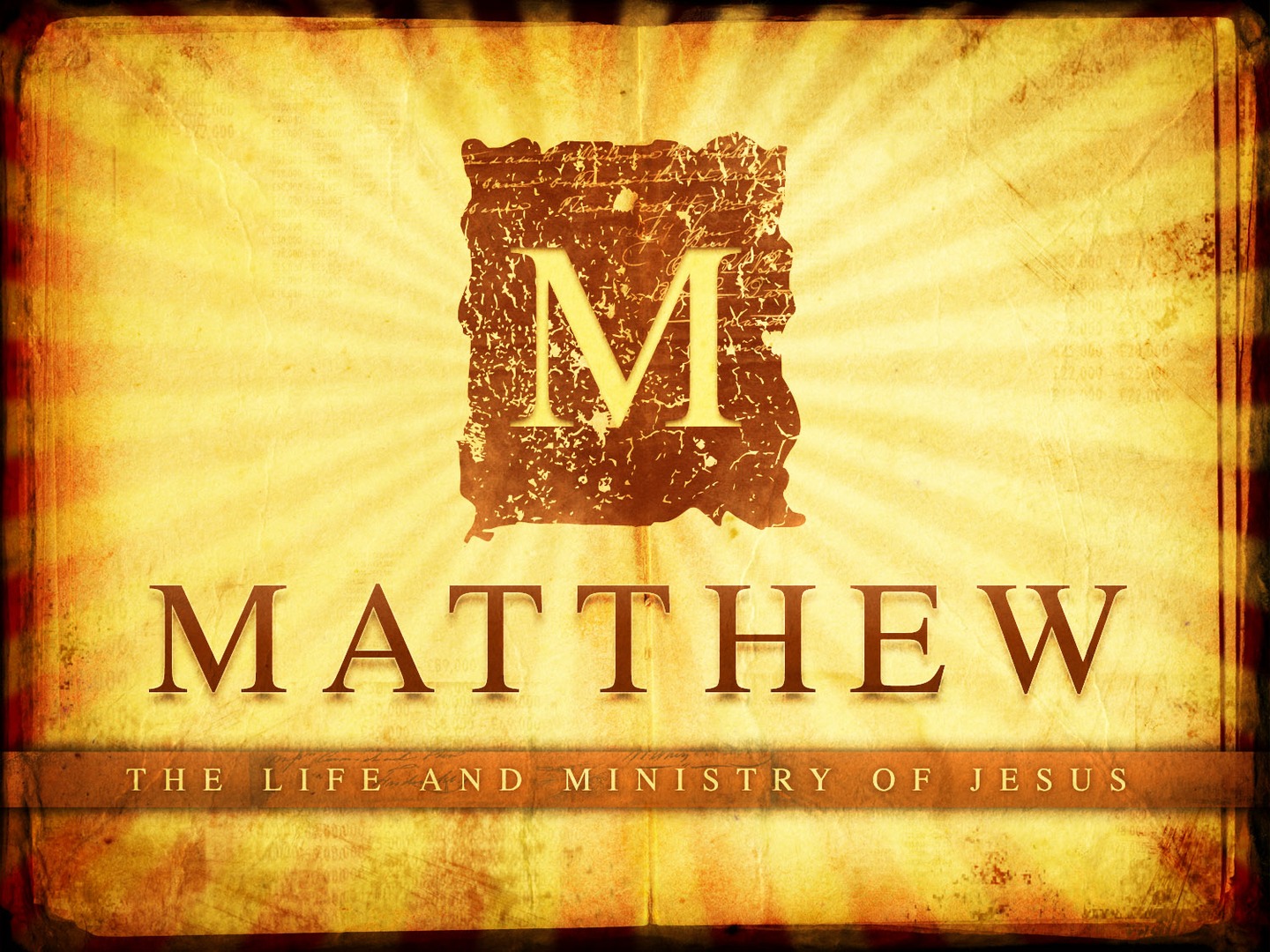Matthew: The Enduring Legacy Of An Apostle And Evangelist
In the annals of history, few figures command as much enduring respect and scholarly inquiry as Matthew, one of Jesus Christ's twelve apostles and the traditional author of the Gospel bearing his name. His story, a remarkable transformation from a reviled tax collector to a devoted follower and influential evangelist, continues to resonate through centuries, shaping Christian understanding and faith. His narrative offers profound insights into the early Christian movement, the life and ministry of Jesus, and the foundational principles of obedience and discipleship.
This article delves into the life, ministry, and profound impact of Matthew, drawing from ancient traditions and modern scholarship. We will explore his pivotal role in chronicling the life of Jesus, the unique purpose of his Gospel, and how his message continues to be applied in the contemporary world through resources like the NIV Application Bible. Understanding Matthew is not merely an academic exercise; it is an exploration of a foundational pillar of Christian faith, whose words continue to guide and inspire millions worldwide.
Table of Contents
- Who Was Matthew? A Biography
- The Gospel of Matthew: A Cornerstone of the New Testament
- Matthew's Authorship and Historical Perspectives
- Key Themes in Matthew's Gospel
- The Enduring Influence of Matthew
- Conclusion
Who Was Matthew? A Biography
Matthew, one of the twelve apostles of Jesus, holds a unique place in the Christian narrative. Before his transformative encounter with Jesus, he was known as Levi, a tax collector. In ancient Judaism, this profession was among the most reviled, as tax collectors were often seen as collaborators with the Roman occupying forces and were notorious for extorting money from their own people. Their work involved collecting taxes for Rome, a task that frequently led to corruption and social ostracism. Yet, it was precisely to such an individual that Jesus extended an invitation that would forever alter his life and, subsequently, the course of religious history.
Little is explicitly known about Matthew's life prior to his calling, but his profession suggests a level of literacy and financial acumen, skills that would later prove invaluable in his role as an evangelist. His inclusion among the inner circle of Jesus' disciples underscores a central theme of Jesus' ministry: that God's grace extends to all, regardless of their past or societal standing.
Matthew's Call: From Tax Collector to Disciple
The moment of Matthew's calling is one of the most striking narratives in the Gospels. As recounted in the Gospel of Matthew itself (and paralleled in Mark and Luke), Jesus simply walked by his tax booth and uttered two profound words: "Follow me." The response was immediate and unequivocal: Matthew got up and followed him. This act of instant obedience, abandoning a lucrative and established profession to follow an itinerant preacher, speaks volumes about the transformative power of Jesus' presence and Matthew's readiness to embrace a new path. This pivotal event not only marked the beginning of Matthew's discipleship but also set the stage for his eventual role as a chronicler of Jesus' life and teachings. His willingness to leave everything behind serves as a powerful example of radical faith and commitment.
Key Biographical Details and Roles
While detailed personal information about Matthew is scarce in the biblical texts, Christian traditions and internal evidence from his Gospel provide a framework of his identity and contributions.
- Dad Joke Of The Day
- Melinda Trenchard
- Kate Middleton Pippa
- Pauletta Washington Net Worth
- Sophie Rain Leak
| Category | Detail |
|---|---|
| Full Name | Matthew (also known as Levi) |
| Profession (Pre-Disciple) | Tax Collector (Publican) |
| Called By | Jesus Christ |
| Role | One of the Twelve Apostles of Jesus Christ |
| Evangelist Role | Traditional Author of the Gospel of Matthew |
| Key Purpose of Gospel | To prove Jesus is the Messiah to Jewish readers |
| Associated Book | The Gospel of Matthew (First book of the New Testament, Fortieth book of the Bible) |
| Flourished | 1st Century CE, Palestine |
| Western Feast Day | September 21 |
| Eastern Feast Day | November 16 |
| Known For | His immediate obedience to Jesus' call ("Follow me"), detailed genealogy of Jesus, emphasis on Jesus fulfilling Old Testament prophecy. |
| Death (Tradition) | Variously martyred, often by sword or spear, in Ethiopia or Persia. |
The Gospel of Matthew: A Cornerstone of the New Testament
The Gospel of Matthew stands as the first book of the New Testament and the fortieth book of the entire Bible, occupying a prominent position in the Christian canon. Along with the Gospels of Luke, John, and Mark, Matthew's Gospel is considered an inspired—and thus accurate and true—history of the life, ministry, death, and resurrection of Jesus Christ. Its strategic placement at the beginning of the New Testament canon is no accident; it serves as a crucial bridge between the Old Testament prophecies and their fulfillment in Jesus, making it an ideal starting point for understanding Christian theology.
Purpose and Audience: Proving Jesus as Messiah
Matthew's main purpose in writing his Gospel was to prove to his Jewish readers that Jesus is their Messiah. He meticulously builds his case by demonstrating how Jesus, in his life and ministry, fulfilled the Old Testament scriptures. This focus is evident throughout the book, from the opening genealogy connecting Jesus to Abraham and David, to the frequent use of "that it might be fulfilled" clauses, pointing to Old Testament prophecies. For a Jewish audience steeped in the Law and the Prophets, this approach was highly persuasive, presenting Jesus not as a new, foreign deity, but as the long-awaited King and Deliverer promised by God. The Gospel of Matthew is therefore rich in Jewish customs, laws, and interpretations, making it particularly relevant to its initial readership.
Fulfilling Old Testament Prophecy
A defining characteristic of Matthew's Gospel is its consistent emphasis on the fulfillment of Old Testament prophecy. Matthew repeatedly highlights how events in Jesus' life—from his birth in Bethlehem to his virgin conception, his flight to Egypt, his ministry in Galilee, and his eventual suffering and death—were all foretold centuries earlier. This careful linkage served to authenticate Jesus' messianic claims to a Jewish audience who understood the importance of prophetic fulfillment. By meticulously documenting these connections, Matthew sought to eliminate any doubt that Jesus was indeed the Christ, the Son of David, the Son of Abraham, the one promised by God to redeem His people. This theme is crucial for understanding the theological depth and historical context of Matthew's narrative.
The Genealogy of Jesus Christ
The Gospel of Matthew famously begins with "The book of the generation of Jesus Christ, the son of David, the son of Abraham." This genealogy (Matthew 1:1-17) is not merely a list of names; it is a theological statement. By tracing Jesus' lineage through David, Matthew underscores Jesus' royal claim as the rightful heir to the Davidic throne, fulfilling the promise of an eternal king from David's line. By tracing it further back to Abraham, he connects Jesus to the covenant God made with Abraham, through whom all nations would be blessed. This meticulous detailing of ancestry, including the mention of Jacob begetting Joseph, the husband of Mary, of whom was born Jesus, who is called Christ, serves to establish Jesus' historical and theological legitimacy within the Jewish framework, solidifying his identity as the promised Messiah.
Matthew's Authorship and Historical Perspectives
The question of who Matthew in the Bible really was—apostle, disciple, or both—and what modern scholars say about the authorship, life, and legendary death of this influential yet often understated figure, is a topic of ongoing discussion. According to Christian traditions, Matthew the apostle was indeed one of the twelve apostles of Jesus, and he was also one of the four evangelists, as the author of the Gospel of Matthew. This traditional view has held sway for centuries, attributing the first Gospel directly to the eyewitness account of one of Jesus' closest followers.
Traditional Views vs. Modern Scholarship
While tradition strongly supports Matthew the Apostle as the author, modern biblical scholarship presents a more nuanced picture. Some scholars suggest that the Gospel, in its final form, may have been compiled or edited by someone other than the direct apostle, perhaps using Matthew's original notes or oral traditions. This perspective often points to the sophisticated Greek style and the use of Mark's Gospel as a source, which might suggest a later composition than an immediate eyewitness account. However, even these scholars acknowledge the profound influence of Matthew's perspective and teachings within the Gospel. Regardless of the exact authorship, the content reflects a deep understanding of Jewish scripture and a clear theological agenda consistent with an early Jewish-Christian community. The enduring authority and trustworthiness of the Gospel remain undiminished, as it is widely accepted as an inspired and accurate account of Jesus' life.
The NIV Application Bible: Bringing Ancient Messages to Life
The relevance of Matthew's Gospel extends far beyond its historical context, finding new life and application in contemporary resources. Discover the NIV Application Bible, built from the NIV Application Commentary series, to bring the Bible's ancient message into your world. This resource exemplifies how the timeless truths presented by Matthew can be understood and applied to modern challenges and daily living. It bridges the gap between the biblical text and contemporary experience, helping readers grasp the original meaning of the passage and then consider how it might be applied to their own lives. For Matthew's Gospel, this means understanding how Jesus' teachings on the Kingdom of Heaven, discipleship, and righteousness are not just historical accounts but living principles for today.
Key Themes in Matthew's Gospel
Matthew's Gospel is rich with theological themes that define its unique contribution to the New Testament. Beyond proving Jesus' Messiahship, Matthew delves into practical aspects of faith and discipleship, providing guidance for believers in their walk with God.
Obedience to God's Will
A central theme that Matthew emphasizes is the importance of obedience to the will of God. His Gospel answers the question of how obedience to the will of God is demonstrated through the life and teachings of Jesus. The Sermon on the Mount (Matthew 5-7), for instance, lays out a radical ethic of discipleship that calls for more than mere external adherence to the law; it demands an internal transformation and a commitment to living out God's righteousness. Jesus' own life serves as the ultimate example of perfect obedience to the Father's will, even unto death on the cross. For Matthew, true discipleship is characterized by actively doing the will of God, not just hearing His words. This emphasis on practical application makes Matthew's Gospel incredibly relevant for believers seeking to live a life pleasing to God.
The Church of Matthew: Jewish Roots, Gentile Growth
The community for which Matthew wrote his Gospel, originally strongly Jewish Christian, had become one in which Gentile Christians were predominant. This shift is reflected in the Gospel's content, which, while firmly rooted in Jewish tradition and prophecy, also shows an increasing openness to the inclusion of Gentiles. The Great Commission (Matthew 28:19-20), where Jesus commands his disciples to "go and make disciples of all nations," is a clear indicator of this universal vision. Matthew skillfully navigates the tension between the Jewish origins of Christianity and its expanding reach to non-Jews, emphasizing that Jesus' salvation is for all who believe, regardless of their ethnic background. This demonstrates the dynamic growth and evolving identity of the early Christian church, a movement that began with a Jewish Messiah but quickly embraced a global mission.
The Enduring Influence of Matthew
Matthew's influence extends far beyond the pages of his Gospel. As one of the twelve apostles of Jesus Christ and the traditional author of the first Gospel, his contributions are foundational to Christian theology and practice. His detailed account of Jesus' teachings, particularly the Sermon on the Mount, has shaped Christian ethics for millennia. The parables he records, such as the Parable of the Sower, the Mustard Seed, and the Talents, continue to be powerful tools for spiritual instruction and reflection. His meticulous presentation of Jesus as the promised Messiah, fulfilling Old Testament prophecies, remains a cornerstone of apologetics and theological understanding.
The reverence for Matthew is evident in the observance of his feast days: September 21 in the Western tradition and November 16 in the Eastern tradition. These commemorations honor his life, his unwavering commitment to Christ, and his invaluable literary legacy. Despite little being known about the specifics of his post-apostolic life or legendary death, his impact through the Gospel of Matthew is undeniable and everlasting. He provided the early Church, and indeed all subsequent generations of believers, with a comprehensive and compelling portrait of Jesus, ensuring that the ancient message of the Messiah would continue to transform lives throughout the world.
Conclusion
Matthew, the former tax collector turned apostle and evangelist, stands as a testament to the transformative power of divine calling and unwavering faith. His Gospel, the first book of the New Testament, serves as a vital bridge between the Old and New Covenants, meticulously presenting Jesus as the long-awaited Jewish Messiah who fulfills ancient prophecies. Through his unique emphasis on Jesus' teachings, the importance of obedience to God's will, and the inclusive nature of the burgeoning Christian community, Matthew provided a foundational text that continues to instruct, challenge, and inspire.
His legacy is not merely historical; it is living and dynamic, continually brought into our world through resources like the NIV Application Bible, which helps us understand and apply his ancient message to our contemporary lives. The story of Matthew reminds us that regardless of our past, God's call offers a path to profound purpose and lasting impact. We encourage you to delve deeper into the Gospel of Matthew, exploring its rich narratives and timeless truths. What aspects of Matthew's life or Gospel resonate most with you? Share your thoughts in the comments below, and consider exploring other articles on our site that delve into the lives of other influential biblical figures.

Matthew - Bible Book Chapters and Summary - New International Version

The Untold Truth Of The Gospel Of Matthew

Matthew Overview – FBC Cabool